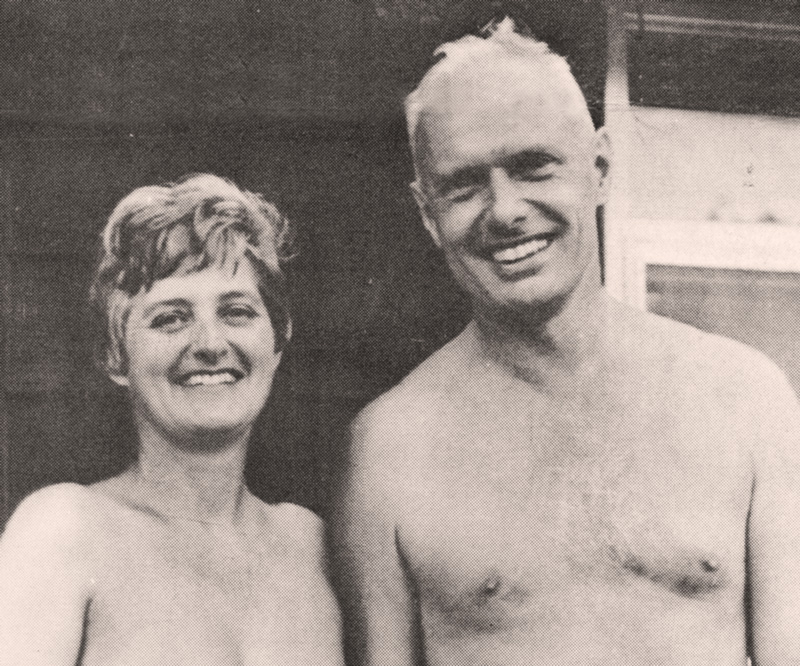 |
| Helen & Doug Beckett in the late 1960’s at Glen Echo Family Nudist Park. |
Today, Doug Beckett would have been 90 years old. Sadly, he passed away last November 17th. While people often mark someone’s passing, it seems more fitting to celebrate their birth because it is a person’s arrival and ensuing existence in our world and that influences us most. So today we honour him by republishing below one of his articles from 1969.
Doug and Helen Beckett were a active members and supporters of the Toronto Gymnosophical Society at Glen Echo Family Nudist Park (1955-2009). It was there that, with a small group supporters, he founded the Federation of Canadian Naturists (FCN) in 1986. Following the breakup of the Canadian Sunbathing Association in 1953 and the failure of the Eastern Canadian Sunbathing Association (ECSA) in 1960, there was no English-speaking association representing Canada. Doug saw the need for a national organization to unite all Canadian naturists and promote naturism to the general public. With support from the FQN, the FCN was formed and together the two organizations now represent Canada in the International Naturist Federation (INF).
Doug Beckett was the first publisher and editor of the FCN’s magazine, Going Natural. He was also a prolific writer often publishing under the pseudonym of W.S. Douglas.
Beckett Circle at Bare Oaks Family Naturist Park is named after Doug Beckett in recognition of his tireless efforts to promote and support the naturist movement.
You can hear Doug Beckett discuss his experiences with the development of naturism in Canada in the February 2010 episode of the Naturist Living Show.
Doug leaves behind two people who supported him throughout his efforts: his wife Helen and his daughter Susan. His legacy also continues through his grandchildren; Elisa, David, and Kiera; as well as his great-grandchild Rhea.
From the Eastern Canadian Sunbathing Association (ECSA) 1969 Canadian Nudist Profile magazine:
The Myth of Modesty
by W. S. Douglas (Doug Beckett’s pseudonym)
It has been frequently claimed that clothing is a necessary part of our civilizing process; that more important than modesty or protection is the fact that clothing provides status and a sense of superiority. Dr. Alfred Adler, a German psychologist, expressed in his writing his belief that the psyche has as its objective the goal of superiority and man has an inherent sense of inferiority which makes him discontent with his nature. Clothing, since it makes no demands on the character, capabilities or even the degree of civilization of the wearer, provides an instant means by which man can claim superiority over his fellow men and set himself up as superior and separate from nature.
As we increase in our understanding of human nature we realize that clothing has been far from completely successful in its contribution to morality. Lawrence Langner in his book “The Importance of Wearing Clothes” states that “Man’s unconscious clothing produced an unexpected result. Instead of reducing man’s sexual desires, it actually increased them. Mankind, striving to rise above the call of the flesh, became one of the most erotic of all living creatures because of his clothing. This posed a neat problem which has been with us for thousands of years – how to control our interest in sex so that, despite this increased stimulation due to clothing, we may enjoy an orderly society based upon a firm foundation of family life. Man has largely solved this problem of control by inventing clothes which in their usage either stimulate or inhibit sexual desire.”
But despite Langner’s last sentence as we look about we see little evidence of clothing to inhibit sexual interest. No matter how plain and drab, clothes cannot eliminate the natural curiosity aroused by the human body being covered and unfamiliar, nor the erotic impulses created by the act of their removal. Those familiar with primitive peoples have observed that clothes covering bodies that once went naked have contributed to the native’s moral decadence by stimulating an unnatural curiosity which never before existed.
Among those who have studied the significance of clothing there seems to be general agreement that clothing is worn for only four basic reasons: as bodily protection, for ornament, as an indication of superiority or rank and to create sexual interest. Modesty has never really had anything to do with it but has been simply a rationalization supporting the fact that clothing exists.
As described in the Encyclopedia Britannica, modesty is a feeling merely of acute self-consciousness due to appearing unusual, and is the result of clothing rather than the cause. Modesty, it would seem, appeared after the invention of clothing and as a result of the sexual stimulation aroused by exposing portions of the body. What may be regarded as modest or immodest, in good taste or bad, varies widely from country to country, people to people, with time of day, place and activity, with the changes of fashion.
From this we can reasonably assume that false modesty is not a legitimate consequence of Biblical references to the shame of nakedness. For the Bible begins with the Adam and Eve story describing nakedness as the natural state of man; the state he was meant to have. Clothes, in the Book of Genesis, are a sign of a great calamity. But as a clothed people, we see shame in nakedness rather than in our inability to accept man as he was created. Peoples who are accustomed to nakedness see no shame in the human body as such. For the ancient Hebrews, as Dubarle has shown (The Biblical Doctrine of Original Sin) nakedness was shameful through its association with prisoner or slave status.
The Greeks partially overcame false modesty. On this point Langner again states: “The fact that the ancient Greeks were not divided as individuals, with their minds in rebellion against their bodies, may be one of the reasons why Greek civilization developed so extraordinarily not only in the field of creative art, but also in science and philosophy. When men feel free to inquire into the nature of their own body functions and to satisfy their curiosity objectively, they tend to allow their imaginations to rove over the outside world and all it contains.”
The frailty of our commonly-held ideas of modesty comes sharply into focus in naturist living. Naturists find that within themselves there is an instinctive sense of rightness guiding both thought and action.
Those who have inquired very hard and with scrupulous honesty into the hold which clothing has upon our thinking realize that claims of modesty are but a part of a larger concept. Clothing plays the exact psychological role in our civilization that superstition did in other societies; everyone plays the game and pretends that it is dead serious. The average North American business man would be much more upset by being seen nude than by knowing he had lied or cheated or overpriced or underpaid; the average murderer would be appalled just as much. No moral law commands as much emotional assent as the prohibition on nudity. This is a fascinating fact. It suggests the theory that men always like to reduce their moral obligations to some simple concrete action that anyone can do, like wearing trousers, and pretend that then they are free of further scruple! Clothing has been treated as some Eleventh Commandment that Moses forgot.
But as naturism continues to gain each year in both practice and public acceptance, we must credit some honesty of thought for permitting us to recognize how often clothing is used merely as a crutch for the personality. How can the human character be strengthened if it must lean so heavily upon this crutch?
Just as clothing has evolved through many stages in successive ages, so we believe the necessity of wearing clothing under all circumstances is also in a state of evolution. In all ages people have, no doubt, felt some superiority when hiding their ignorance of the human body beneath layers of clothing. If this is truly an era of enlightenment, if man has reached a real sympathy for man, what moral need is there for concealment?










